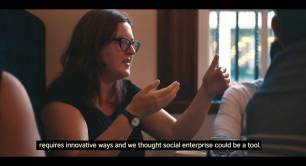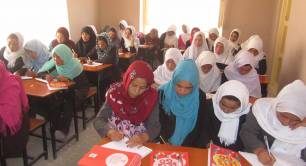‘Want to help Afghanistan? Then buy from our small businesses’
The best way to support Afghanistan’s fledgling business and social enterprise community is to engage their professional services, according to a Kabul-based entrepreneur.
Speaking to Pioneers Post by phone from the capital city this week, the business owner – unnamed to protect his safety – said he expected a “drastic change” to the startup scene since the Taliban swept to power last week. Companies that relied on international clients, partners or donors could suffer, with a “tremendous impact on the economy”.
The unexpectedly fast takeover by the Taliban has prompted widespread fears of a return to repression and violence. Much attention has focused on immediate needs including providing emergency aid and ensuring safe passage for those fleeing the country.
If you want to show that you’re in this with us, support small businesses like ours
But when asked what the social enterprise community could do, the entrepreneur urged them to consider a longer-term solution: outsourcing work to companies in Afghanistan.
“If you want to show that you’re in this with us… it’s fine to send us messages and stuff, but rather than that, support small businesses like ours. Connect us with potential clients outside [Afghanistan], those who we can potentially provide services to.”
Entrepreneurship has developed in recent years, with backing from international organisations including Google’s Startup Grind and the Founder Institute, a Silicon Valley-based accelerator. Social enterprise is less well-established, but is starting to take root, with ventures working on areas including education, women’s empowerment and security.
Afghan companies could provide professional communications, technology, consulting and financial services, the entrepreneur said. With international organisations now leaving the country, companies would need to rely on diaspora and other clients from abroad.
If outsourcing to international clients took off, it could end up providing work to several hundred young people in Kabul, the entrepreneur said – bringing more than just economic benefits. “Jobs create peace... We believe that if we can provide jobs to people, peace will come as a consequence.”
He added: “If there are professional partnerships or collaborations, let's do it… I’m not into aid, and asking for people to help us and stuff, but I'm into: ok, let’s work together. And then we provide you a service and we’re paid at the end of the day.”
‘Everyone is scared’
The country’s economic future is unknown – even before the Taliban took over, the World Bank described Afghanistan’s economy as “shaped by fragility and aid dependence”.
The entrepreneur described the atmosphere this week as one of uncertainty and fear. The Taliban rule of 20 years ago was “one of the worst periods in the Afghan story… no one wants to go back to those times”.
“Everyone is scared, everyone is fearful, and we don’t see a clear future for us,” he said.
Everyone is fearful, and we don’t see a clear future for us
Other entrepreneurs have reported similarly grave concerns. Ehtesab, an app launched in March 2020, provides streamlined security-related information to users. Founder Sara Wahedi, told Rest of World earlier this week that she and her team – all aged under 25 – did “not feel safe in the current climate”, and that they were “obscuring the identities of female staff members”.
She described the startup community as “very important” to Afghans, since entrepreneurship allowed people “to mould, innovate, and play with a lot of new ideas”. The lack of security would make it harder to attract foreign investment and be “a huge hindrance for the entire startup community”.
Skoll fellow Sakena Yacoobi, president and executive director of the Afghan Institute of Learning, said on 16 August that her staff were “as of now” unharmed. But in a powerful letter posted on Twitter, she described a city “in complete chaos” and called on followers to help provide emergency supplies and to pressure governments to assist women and girls.
Her message was also one of defiance and determination. “AIL will do what AIL has always done. We will continue to education and provide a safe space for children an women... While we are afraid, we are not defeated,” she wrote.
Readers can support the Ehtesab fundraiser here; find more suggestions of ways to help from Sakena Yacoobi here.
Thanks for reading Pioneers Post. As an entrepreneur or investor yourself, you'll know that producing quality work doesn't come free. We rely on our subscribers to sustain our journalism – so if you think it's worth having an independent, specialist media platform that covers social enterprise stories, please consider subscribing. You'll also be buying social: Pioneers Post is a social enterprise itself, reinvesting all our profits into helping you do good business, better.




